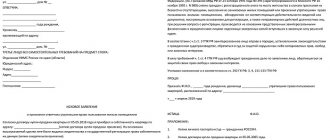Discharge of minors
Citizens who have not reached the age of majority can be discharged only with the consent of their parents replacing them or the guardianship authorities.
Exceptions:
- A minor citizen has a share in a privatized apartment,
- Simultaneous registration in housing with a smaller area.
You can read the article about the possibilities of registering a child under 18 years of age in a living space.
How to expel a non-owner from a house without consent through the court
From a lawyer
First of all, it is necessary to determine the chances of a successful outcome of the case. In order to strengthen these chances, it is better to seek help from a lawyer or attorney. By working together with a professional, it will be possible to provide the court with undeniable evidence that you are right.
Procedure and procedure
The purpose of going to court is to recognize the loss of the right to use residential real estate. Often there is a need, in addition to deregistration, to evict a citizen. In this case, the plaintiff files two statements of claim. Litigation in the registration category is considered by district or city courts.
IMPORTANT! To expel citizens from private households, it is necessary to apply not to the court, but to the Department of Internal Affairs or the MFC (“My Documents”). According to Federal Law No. 5242-1 of June 25, 1993, the corresponding service is also provided by passport offices at the management company.
Instructions for removing a person from home without his consent:
- Notifying the tenant of eviction through the court. According to the Code of Civil Procedure of the Russian Federation, Art. 113, it is impossible to discharge a citizen without notifying him of his intentions. The notice is a subpoena. Having received the notification, the defendant signs, confirming the fact of familiarization. After which the notice is sent back to the court. If there is no signature of the addressee on the notification, it is considered executed.
- Drawing up a statement of claim. The statement of claim is drawn up taking into account the circumstances of the case. Each case is individual. It's better to contact a professional. It will help formulate a number of demands into a common goal and draw up several claims.
- Submitting documents to the court. You must first pay the state fee at the courthouse or at the bank cash desk. After the package of documents is completely collected, they are transferred to the secretary at the reception of the district or city court. Documents are checked for legal literacy. If there are no complaints, the secretary of the court office accepts the documents, issuing a receipt of acceptance. If the contents of the collected package are incorrect, documents will be refused to be accepted in order to eliminate them.
- Attendance at preliminary hearings. According to the Code of Civil Procedure of the Russian Federation, paragraph 1 of Art. 154, the period for consideration of a claim by a district court varies within 2 months. After accepting the submission of documents, the judge sets a date and time for the preliminary hearing. The plaintiff has the right to petition the court to file judicial requests with the following authorities: pension fund, insurance companies, passport offices, management company, clinic, etc.
- Participation in hearings. In the absence of the plaintiff or his representative at the hearings, the court makes a decision in absentia to remove the citizen from the living space (Civil Procedure Code of the Russian Federation, Part 4, Article 167). The owner calls witnesses and explains each claim. Based on the evidence presented, the judge makes a decision.
- Receiving the final court decision. An absentee or in-person court ruling comes into force one month from the date the hearing ends. According to the Code of Civil Procedure of the Russian Federation p. 321, another 7 days may be assigned for the defendant to appeal the court decision. If such a need does not arise, the plaintiff receives a copy of the court decision in the office.
- Extract from a private household. The last stage in resolving this issue is the decree of seals on the removal of a citizen from registration. This procedure is carried out by employees of the district department of internal affairs or the MFC. It is also possible to apply through State Services or with registration at a new address.
This is important to know: Why do you need an archival extract and how to get it
Statement of claim for discharge from a private home without consent
Contents of the claim:
- Name of the court, address, full name and contact details of the parties. Next, indicate the price of the claim (0 rubles) and the amount of state duty (see below),
- Description of the circumstances of the appeal (full name of the plaintiff, address of the house, registration details of the defendant (date). It should be noted that the citizen has been absent from the house for a long time, the absence of obstacles from the plaintiff and his family members, the absence of the defendant’s personal belongings in the house, neglect of household duties or debts Provide evidence in accordance with housing, family and civil legislation.
- Basic requirements (recognize the lost right to use residential real estate on the part of the defendant),
- List of documents attached to the statement of claim,
- Date in the format “hh.mm.yy”,
- Plaintiff's signature.
on recognition as having lost the right to use residential premises and deregistration
From a lawyer
The strategy for protecting interests depends on a clear statement of the owner's requirements. The lawyer will draw up a clear plan for you and select the most compelling facts for a successful resolution of the issue.
Required documents
Collection of documents is the most important part of the process, since the judge pays attention only to those documents that confirm the plaintiff’s case.
List of documents for applying to the court:
- A copy of the plaintiff's passport,
- A document confirming ownership of a private house,
- Grounds for the acquisition of real estate (sale and purchase agreement, certificate of inheritance, deed of gift in favor of the plaintiff, change agreement, etc.),
- An extract from the house register is required,
- If former spouses are discharged, then a certificate of divorce;
- Written evidence of the fact that the claim was sent to the defendant (for example, postal items with a stamp or signature of the defendant on receipt, a written refusal is issued voluntarily);
- Receipt for payment of state duty,
- Other documents if necessary.
As mentioned earlier, the secretary checks the correctness of the package of documents. If all conditions are met, the documents are submitted to the court for consideration.
IMPORTANT! Copies of all documents are submitted according to the number of persons participating in the process. In accordance with the specified data, the secretary notifies that the case has been transferred to court.
Discharge of a resident without his presence
There are several ways to remove a tenant from a living space without his consent:
- By the tribunal's decision,
- By proxy,
- Simultaneous registration at a new address.
The main reasons for a person’s failure to appear at the registration authorities for discharge:
- Residence in another city,
- Declared dead or missing,
- Stays in prison
- Seriously ill,
- Lost the right to use housing by court decision.
If a person lives outside the Russian Federation, he has the right to contact the migration service by mail with an application for deregistration by mail to the migration service.
Dates of discharge
Since each case is individual, the exact time frame for litigation is uncertain.
Main deadlines:
- Familiarization with the statement of claim – from 5 days to 2 months,
- Preliminary and main hearings – up to 1 month,
- The time to appeal is 1 month.
This is important to know: Discharge a person from an apartment after death
The defendant can extend the time frame for the consideration of the case by filing endless complaints. This often happens due to the lack of necessary knowledge on the part of the plaintiff. In order not to waste a lot of time and effort on litigation, you should use the services of experienced lawyers or an attorney.
Be sure to read how to discharge a temporarily registered person without his consent.
State duty and expenses
Litigation is a costly process. The minimum cost is payment of the state duty, which is 300 rubles. Provided that the defendant has several claims, the amount of the state duty may be increased.
Along the way, there will be a need to contact a notary, for example, to approve a purchase and sale agreement. You should clarify the cost of legal services in advance.
Arbitrage practice
Expert opinion
Golubev Denis Petrovich
Lawyer with 7 years of experience. Specialization: civil law. Author of dozens of articles in the media
The court often goes “halfway” to the defendant. For example, if he has nowhere to live or temporarily does not live at his place of registration due to his studies. The judge's decision depends on the demands made by the defendant. In the process of studying the appeal, the court carefully examines all the circumstances of the case. It happens that the court grants a deferment for discharge/eviction from the house. The law does not provide for an exact period of deferment, but on average the defendant is given from 3 months to 2 years.
Example.
District Court
Tula considered the case of A.V. Kondratiev, who filed a claim for the discharge of a deceased resident of a private house. The man got the property under a gift agreement, but a distant relative of the donor was in the house. He retained the right to live in a private house - he did not have any shares. After living in the house for a while, a distant relative left in an unknown direction. After 8 months it became known that he had died.
Kondratyev was not a close relative of the deceased, so he was not given a death certificate. The deceased had no other relatives, so the original certificate was in the registry office. Kondratyev contacted the Department of Internal Affairs directly at the place of registration of the property. But there he was told that his discharge would not take place without a court decision.
The man filed a claim in court to remove the deceased from the registration register. At the preliminary hearing, Kondratyev petitioned the court to submit a request to the registry office. Soon the answer came. And the death certificate of the relative was provided to the court. The deceased was discharged from a private home.
When deciding on the discharge, the court took into account that Kondratyev actually received the house under a donation agreement (Article 572 of the Civil Code of the Russian Federation), registered ownership (Article 209 and Article 292 of the Civil Code of the Russian Federation), as well as the established fact of the death of the tenant (Clause 1 of Art. 278 Code of Civil Procedure of the Russian Federation). Thus, Kondratyev filed one claim for recognition of the loss of the right to use residential premises on the part of a deceased relative.
How can I help a relative who wants to be discharged?
It happens that a person himself wants to be discharged as soon as possible. For example, when a child has grown up, reached adulthood and purchased an apartment or received it as a gift from his grandmother. Of course, he wants to quickly start an independent life in a new place. Or a relative who has moved asks you to help him sort out his housing situation. How to discharge a person from an apartment with his consent?
In a situation where a person himself insists on discharge, the procedure will be as follows:
- The relative must write a power of attorney and have it certified by a notary. In it, he indicates that he trusts you to handle his documents.
- You will need to come to the passport office with the following papers - a notarized application and power of attorney, a relative’s passport, a military ID (if he is liable for military service).
- When all the documents have been submitted, the passport office staff will set a day for you to come pick up your loved one’s passport. You will see a discharge stamp in it.
To prevent the matter from going to court, it is better to try to resolve problems with the discharge peacefully. But if an agreement fails, or is simply impossible (in the case when a person is not in this apartment for a long time), you have to go to court.
It’s better to endure the inconvenience of collecting documents and going to court and the passport office for a while, but then live in peace in the apartment!











